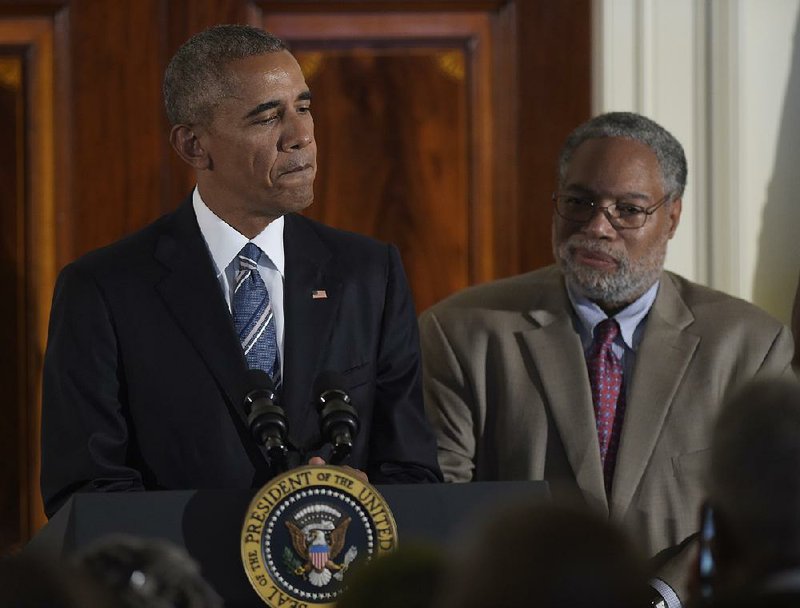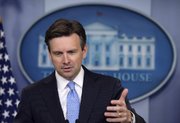WASHINGTON -- President Barack Obama vetoed legislation Friday that would allow families of 9/11 victims to sue Saudi Arabia over its alleged ties to the terrorists who carried out the attacks.
Reader poll
Should the families of 9/11 victims be allowed to sue the government of Saudi Arabia?
- Yes
- No
119 total votes.
Congressional leaders plan to have override votes in the coming days, and supporters of the legislation say they are confident they can succeed in overturning the president's action. Congress' previous attempts to overturn Obama's vetoes have all been unsuccessful.
The legislation, also known as the Justice Against Sponsors of Terrorism Act, would allow U.S. courts to waive claims to foreign sovereign immunity in cases involving terrorism on U.S. soil.
The administration contends that this would break a long-standing practice that sovereign nations are protected from these types of legal threats. The result, according to the White House, is that U.S. officials could now be sued in foreign courts over U.S. military or diplomatic actions abroad, which administration officials said poses a threat to national security.
"I recognize that there is nothing that could ever erase the grief the 9/11 families have endured. My Administration therefore remains resolute in its commitment to assist these families in their pursuit of justice and do whatever we can to prevent another attack in the United States," the president wrote in his veto message to Congress. "Enacting [this legislation] into law, however, would neither protect Americans from terrorist attacks nor improve the effectiveness of our response to such attacks."
He went on: "The [Justice Against Sponsors of Terrorism Act] would be detrimental to U.S. national interests more broadly, which is why I am returning it without my approval."
But the families of 9/11 victims who have been advocating for the bill said in a statement Friday that they were "outraged and dismayed at the president's veto," rejecting "the unconvincing and unsupportable reasons that he offers as explanation."
The bill passed the House and Senate without any dissents, but since that time several lawmakers have expressed misgivings with the measure -- echoing the concerns voiced by the White House.
White House spokesman Josh Earnest told reporters Friday that the administration has been "getting conflicting signals from members of Congress" and was not sure whether their concerns would lead them to vote against an override.
"The president's not blind to the politics of this situation," Earnest added, noting that opposing a bill championed by 9/11 families is "politically inconvenient." But Obama is "willing to take some heat," Earnest said, because the risks the bill poses to U.S. national security are too high.
Various national security experts and even the European Union's delegation to the United States have weighed in with similar warnings in the past several days.
The families advocating for the bill, in a response circulated by their lawyers insisted the measure would deter terrorism, "no matter how much the Saudi lobbying and propaganda machine may argue otherwise."
The override votes likely will take place next week.
"Now that we have received the veto message from the president, the Senate will consider it as soon as practicable in this work period," said David Popp, a spokesman for Senate Majority Leader Mitch McConnell, R-Ky.
House Minority Leader Nancy Pelosi, D-Calif., indicated Thursday that there was sufficient support in the House to override Obama's veto. Yet the White House has worked to try to peel off supporters, and said Friday that it was unclear whether enough had changed their minds to avert an override.
Members are wary of voting against the wishes of 9/11 victims' families, who insist that the legislation is necessary for them to stand a chance of suing Saudi Arabia over the alleged material support members of the Saudi government provided the attackers.
Fifteen of the 19 men who carried out the attacks were Saudis. Families of the victims spent years lobbying lawmakers for the right to sue the kingdom in U.S. court for any role elements of Saudi Arabia's government may have had in the attacks.
Saudi Arabia has argued that it had nothing to do with the attacks, and the 9/11 Commission also said it did not find a connection.
"Saudi Arabia has long been considered the primary source of al Qaeda funding, but we have found no evidence that the Saudi government as an institution or senior Saudi officials individually funded the organization," the commission's report reads. Recently declassified pages from a 2002 congressional inquiry into the attacks also shed almost no new light on the matter.
Still, Saudi Arabia, which already had spent in excess of $3 million on lobbying this year, stepped up its efforts considerably this week as Congress braced for the president's veto.
The kingdom added another three lobbying contracts to its roster, retaining the services of former Senate Republican Leader Trent Lott of Mississippi and former Democratic Sen. John Breaux of Louisiana as part of a $100,000 monthly contract with Squire Patton Boggs, according to documents filed under the Foreign Agents Registration Act. Saudi Arabia also filed Foreign Agents paperwork this week establishing a new contract with lobbying firm SGR worth $45,000 per month, and entered into an arrangement with the Glover Park Group for an as-yet undisclosed sum, according to filings.
Saudi Arabia is a longtime U.S. ally in the Middle East. The U.S. relies on the Saudis as a counter to Iran's influence in the region as well as to help combat the spread of terrorism throughout the Middle East.
call for 'cooler heads'
Lawmakers who support the legislation have argued that if Saudi Arabia did nothing wrong, it should have nothing to fear in this law.
"This is a disappointing decision that will be swiftly and soundly overturned in Congress," Sen. Charles Schumer, D-N.Y., who co-wrote the legislation with Sen. John Cornyn, R-Texas, said in a statement. "I believe both parties will come together next week to make [the Justice Against Sponsors of Terrorism Act] the law of the land. If the Saudis did nothing wrong, they should not fear this legislation. If they were culpable in 9/11, they should be held accountable. The families of the victims of 9/11 deserve their day in court, and justice for those families shouldn't be thrown overboard because of diplomatic concerns."
Still, some members from both parties have called for Congress to delay its planned override vote so that lawmakers could try to renegotiate the bill with the White House.
"I hope that it can be put off, and cooler heads will prevail," the Senate Intelligence Committee's ranking Democrat, Dianne Feinstein of California, said this week, calling efforts to move ahead with the bill in its current form "a mistake."
The scope of the legislation was already narrowed once this year to respond to concerns raised by the administration and members of Congress.
Congressional leaders have indicated they are not interested in extending the process any longer.
"[The legislation's] a fait accompli if it happens over the next week," Senate Foreign Relations Committee Chairman Bob Corker, R-Tenn., who has voiced concerns about the legislation, said Tuesday. "Unless there are 34 people willing to fall on their swords over this, it's probably not worth falling on your sword over."
Since the bill's passage, the White House has lobbied to persuade lawmakers to withdraw support, and found some sympathetic listeners. The bill had passed by voice vote -- meaning lawmakers didn't have to go on the record with their positions -- and the White House was hoping the prospect of a recorded vote would lead some Democrats to reconsider publicly rebuking their president.
Information for this article was contributed by Karoun Demirjian and Karen DeYoung of The Washington Post and by Darlene Superville and Josh Lederman, Richard Lardner, Erica Werner and Lisa Lerer of The Associated Press.
A Section on 09/24/2016


